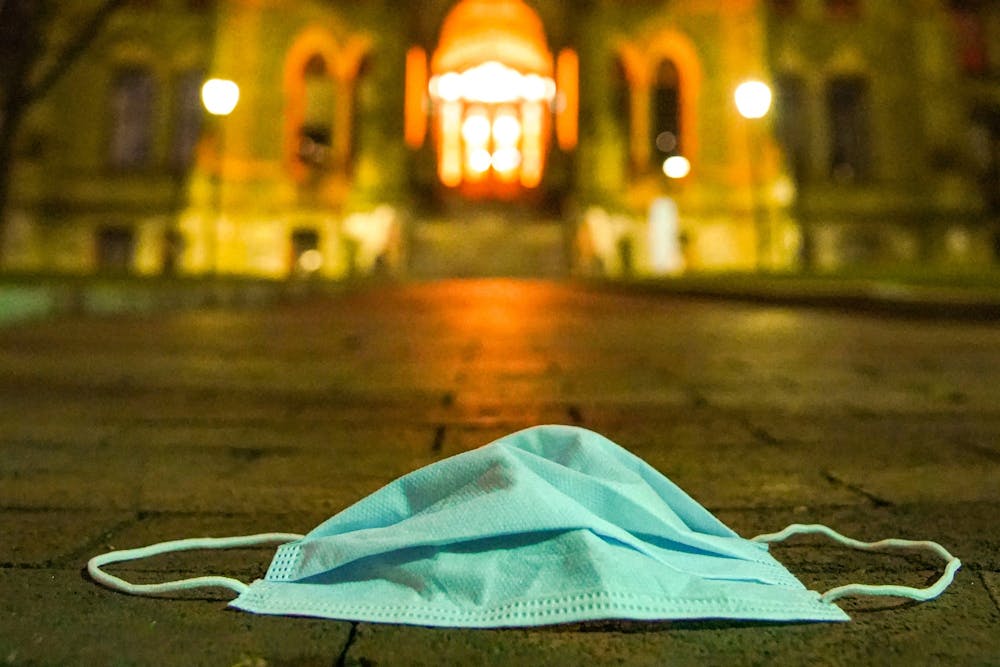
Penn's mask mandate was recently uplifted following a declining trend of COVID-19 cases.
Credit: Chase SuttonChange is frequently daunting. Like many students at Penn, I distinctly remember the collective chaos that ensued throughout American educational institutions following the switch to virtual learning at the start of the COVID-19 pandemic. Now, students find themselves trapped in a similarly nerve-racking scenario: deciding whether to continue masking up in light of the University's new mask-optional policy.
While I served as UCLA’s student body president at the start of the pandemic, Bruins understandably raised important concerns surrounding the uncertainty of their futures on campus, and how to best adapt to evolving public health guidance. Now, while serving as the Graduate and Professional Student Assembly’s wellness director at Penn, Quakers have similarly begun to take part in evaluations of their own decisions on whether to continue to mask up.
As is already apparent on campus, students will ultimately arrive at different conclusions as to whether to mask up. Students who are immunocompromised, are caretakers for vulnerable community members, or are understandably anxious about the changing guidance may continue to take important precautions even as the University rolls back some public health measures. Alternatively, some students who are fully vaccinated and boosted may feel that masking up is no longer necessary in certain spaces and contexts as Philadelphia's COVID-19 daily case average remains low.
Whatever your choice may be, working together to support our collective health and well-being remains a priority even as COVID-19 cases presently reach a new low. Quakers should persist in supporting fellow students who remain particularly vulnerable to COVID-19, or who simply wish to continue masking up. Students should also be receptive to others who may understandably be eager to return to some sense of normalcy after two years of vigilance and taking into consideration the current public health data available.
In the event that these two perspectives raise disagreements among students, those who elect not to mask should remain deferential to the health needs of others, and should err on the side of being cautious. In either case, our community's willingness to continuously re-evaluate masking decisions in varying contexts remains more important than ever. This is especially true in light of the real likelihood of more waves and in contexts where students who otherwise may elect to unmask are with those who may still remain particularly vulnerable to COVID-19.
Finally, the largely unspoken reality that has already revealed itself in the first few days of this new guidance is that some individuals on campus will undoubtedly develop broad assumptions about others depending on their decision to wear a mask. Specifically, assumptions about students who continue to mask up despite the new guidance have the real potential to inadvertently target Penn community members that are most vulnerable to the effects of COVID-19.
Ultimately, Quakers know that this is not the first change in COVID-19 guidance, and it will undoubtedly not be the last. Distinctly, though, for many of us, masking represents an important symbol of our collective efforts to combat what has been a historically challenging two years of working to protect our communities. Because of this, the decision to take off or continue to wear a mask may be a deeply personal decision for many students on campus given each of our own lived experiences.
More than ever, the Penn community should work together to support our peers who may struggle with this change, and be willing to modify our own decisions in light of the changing health needs of those around us. If we can do this, we may find ourselves better able to adapt to change than we thought we could at the start of the pandemic.
ROBERT WATSON is a Penn Law and Graduate School of Education second year from Louisville, Ky. His email is rbwatson@pennlaw.upenn.edu.
The Daily Pennsylvanian is an independent, student-run newspaper. Please consider making a donation to support the coverage that shapes the University. Your generosity ensures a future of strong journalism at Penn.
Donate



